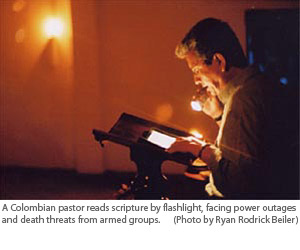 The 50-year Colombian armed conflict pits government armed forces and right-wing paramilitary groups against leftist guerrillas. Church people, part of the unarmed civilian population struggling to stay outside the conflict, are caught in the cross-fire. Since 2000, the United States has provided nearly $5 billion in aid to the Colombian government, roughly 80% of it military, alternately under the auspices of the “War on Drugs,” or the “War on Terror.” United States policies have failed to meet their stated aim, and instead enflame the conflict and contribute to the resulting humanitarian crisis.
The 50-year Colombian armed conflict pits government armed forces and right-wing paramilitary groups against leftist guerrillas. Church people, part of the unarmed civilian population struggling to stay outside the conflict, are caught in the cross-fire. Since 2000, the United States has provided nearly $5 billion in aid to the Colombian government, roughly 80% of it military, alternately under the auspices of the “War on Drugs,” or the “War on Terror.” United States policies have failed to meet their stated aim, and instead enflame the conflict and contribute to the resulting humanitarian crisis.
Now the political waters in Colombia are growing from unsettled to turbulent; conditions are likely to get worse before they get better. I feel like the power players are more boldly and unselfconsciously asserting a dimension of “fragile unreality,” as Russian fiction author Nabokov described his context of totalitarian regime.
A hunted Colombian Baptist pastor tells me his drama. The cast of characters is outrageous; hit men are taxied by those who should be their target’s protectors. It would be easier to convey through a one-act play in which executioner and savior are played by the same actor.
Dozens of government members are currently under investigation for their ties with the right-wing death squads. Some are very close to Colombian President Uribe. All the members of Congress from one department are behind bars. The witnesses are being killed.
To cast attention from the “parapolitica” closing in, President Uribe accuses his political opponents (including at least one person I know well) of being terrorists dressed as civilians. They are at risk. Aren’t voices of dissent permitted, if not necessary, in a democracy?
A man from church is attacked cattycorner from where I work, at Justapaz. Presumed paramilitary agents said they didn’t hunt him down in the Mennonite church beside our office because the entrance was surrounded by “strong men.” He laughed at them because the only human there was a disabled person who watches the cars. They beat him up, but somehow he escaped death for a third time.
As Nabokov writes in Invitation to a Beheading, there is a “mistrust of what we call everyday reality, an acute sense of that reality’s fickleness and frailty.”
What can you do? Colombian church leaders entreat you: “Sisters and brothers, join us in fervent prayer and faithful witness for a sustainable peace in Colombia.” Respond to the invitation of Colombia Protestants and Catholics by participating in the Days of Prayer and Action for Peace in Colombia, May 20 and 21. Share their stories of suffering and hope. Will you join with hundreds of other North American and Colombian congregations in joint worship, and public actions and advocacy? Learn more about how you can take action.
 Janna Hunter-Bowman is the Coordinator the Documentation and Advocacy Program of Justapaz, the peace and justice ministry of the Colombian Mennonite Church. She works with regional teams to register the impact of the armed conflict on Colombia’s Protestant churches. Learn more about their work in their recent report: A Prophetic Call: Colombian Protestant Churches Document Their Suffering and Their Hope.
Janna Hunter-Bowman is the Coordinator the Documentation and Advocacy Program of Justapaz, the peace and justice ministry of the Colombian Mennonite Church. She works with regional teams to register the impact of the armed conflict on Colombia’s Protestant churches. Learn more about their work in their recent report: A Prophetic Call: Colombian Protestant Churches Document Their Suffering and Their Hope.

